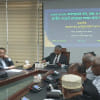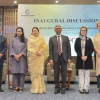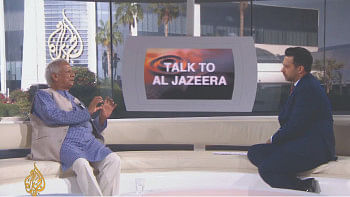Tax authority to split. Will it bring the desired outcome?

The government is set to dissolve the National Board of Revenue (NBR) and replace it with two new divisions, aiming to modernise tax administration, boost revenue collection, and attract more investment.
A draft ordinance has been readied for the separation, outlining the changes.
Under the draft "State Policy and Revenue Management Ordinance, 2025", both the NBR and the Internal Resources Division will be abolished.
In their place, two new bodies will be created -- the Revenue Policy Division and the Revenue Management Division.
Touted as a historic overhaul, the move has ignited debate over whether it will drive meaningful reform or merely deepen the layers of bureaucracy, given the NBR's persistent failure to meet its targets.
Splitting the revenue board has been a long-overdue task, with multilateral lenders, particularly the International Monetary Fund (IMF), urging the authorities to improve the country's tax-to-GDP ratio, which is currently one of the lowest in the world.
In its April issue of the Bangladesh Development Update, the World Bank (WB) also suggested separating tax policymaking and administration.
Apart from external pushes, there is also a question of principle: the same body should not be responsible for both making tax policies and enforcing them.
Now, amid the separation moves, some believe the split could solve persistent complaints about tax harassment from the business community and bring much-needed efficiency.
Others, however, fear it will merely create more opportunities for promotions and power consolidation within the bureaucracy.
In a context already marred by weak tax compliance and bureaucratic red tape, questions hang heavy over whether the split will usher in real change or simply repackage old problems with new labels.
Snehasish Barua, managing director of SMAC Advisory Services, said that in theory, the initiative could be seen as timely and progressive.
"When one institution handles policymaking, implementation, and evaluation, transparency and accountability suffer," he said.
An independent policy division, he argued, would ensure greater autonomy and neutral oversight. However, success would depend on tackling deeper systemic issues.
"The draft ordinance suggests that a secretary or senior secretary will head the new policy division. But the key question is how will their experiences be defined?"
Barua said that beyond administrative ability, a clear understanding of revenue policy, international taxation, and socio-economic context would be essential for the posts.
'DISASTROUS GAPS'
To push forward NBR reform, the finance ministry formed an advisory committee on October 9 last year.
Among its members were two former chairmen of the revenue board Muhammad Abdul Mazid and Nasiruddin Ahmed; former tax members Md Delwar Hossain and Aminur Rahman; and former customs member Farid Uddin.
The committee's report, submitted to the finance adviser, outlined the rationale for separating revenue administration from policymaking.
Now, Md Farid Uddin, an advisory committee member, criticises the draft ordinance for not taking into account what they have recommended.
He finds "disastrous gaps" between their recommendations and what the draft outlines.
"This ordinance is simply leading the country's revenue management into chaos. They made it unnecessarily complicated," said Uddin.
Referring to the draft, he said that the pledge to prioritise "experience in revenue collection" was hollow without a clear definition, leaving the door wide open for manipulation.
He pointed out that someone with minor experience in stamp duty could claim to be a revenue expert.
"Anyone from the administration could be posted there after a few days' work in stamp duty. The gaps are massive. Truly jarring and also disastrous," he said.
Uddin said the committee proposed appointments based on clear, specific criteria, prioritising expertise in fiscal matters rather than seniority or political favouritism.
"Now, with the draft ordinance, recruitment will be arbitrary. Anyone favoured by the government could be appointed, and the entire system risks collapsing further into mismanagement," he commented.
He said the draft ordinance has ignored proposals for professional competence and integrity, modelled after Australia's revenue department.
Uddin also criticised the provision that the Revenue Policy Division would monitor the activities of the Revenue Administration Division.
"Policy division should not do it," he said.
Aminur Rahman, another advisory member, voiced similar concerns.
He said that their vision had been to create an autonomous entity outside the direct control of any ministry, much like the Bangladesh Bank. "But that vision hasn't been fully realised in the draft ordinance."
"Our goal was genuine structural change, not a mere replication of the current system. Our thought process was that within the bureaucratic machinery, we often make decisions without properly considering the interests and difficulties of stakeholders."
That is why, Rahman said, they proposed including representatives from businesses, economists, and intellectuals in the new commission.
Another key recommendation was that the heads of both divisions should come from a revenue background, either from the customs cadre or with equivalent experience.
"But in the ordinance, that requirement was completely left out. Now, the government can appoint any officer they choose as secretary," he commented.
"If revenue policy remains embedded within the traditional bureaucratic framework, true reform will remain a distant dream," Rahman added.
He added that they hope the government will take effective steps to sort out these issues before publishing the gazette.
TAX ASSOCIATIONS VOICE CONCERNS
Tax associations, including the BCS Taxation Association and the BCS (Customs and VAT) Association, have opposed the draft ordinance, saying that it could undermine the government's reform efforts.
In a statement yesterday, the Customs and VAT Association said, "If the participation of experienced officers from these two cadres is not ensured at the policymaking and responsible levels, a serious gap between field experience and policy could emerge, possibly undermining the fundamental goals of revenue reform."
The association also said that allowing the policy division to monitor tax enforcement could create legal conflicts.
Mutasim Billah Faruqui, president of the BCS Taxation Association, said they initially welcomed the separating initiative in the greater interest of the state, even though it involved splitting the board.
"But if the move sidelines our two cadres to infiltrate a specific cadre, it will ultimately demoralise the NBR officials," he said.
'OUTCOME DEPENDS ON IMPLEMENTATION'
Professor Abu Eusuf, a member of the white paper panel on the state of the economy formed by the interim government after the ousting of the Awami League government last year, welcomed the separation move but stressed the importance of the proper implementation of the ordinance.
He said the objective of the separation is clear: to strengthen direct taxation, reduce dependency on indirect taxes, and broaden the tax net by placing the right people in the right roles.
"But everything depends on implementation. On paper, reforms often look perfect, but the real test lies in execution and political will," said Eusuf, executive director of local think tank Research and Policy Integration for Development (RAPID).
"To meaningfully expand our fiscal space, revenue forecasting must become evidence-based and participatory, rather than dictated from above," he said.
"If policymaking and revenue collection can operate independently and free from political interference, we can truly reshape our fiscal future," he added.

 For all latest news, follow The Daily Star's Google News channel.
For all latest news, follow The Daily Star's Google News channel. 








Comments